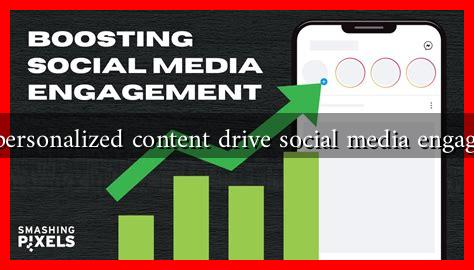-
Table of Contents
Does Personalized Content Drive Social Media Engagement?
In the ever-evolving landscape of social media, brands are constantly seeking innovative ways to capture the attention of their audience. One strategy that has gained significant traction is the use of personalized content. But does personalized content truly drive social media engagement? This article delves into the effectiveness of personalized content, supported by research, examples, and case studies.
The Power of Personalization
Personalization refers to the practice of tailoring content to meet the specific preferences and behaviors of individual users. In the context of social media, this can include customized posts, targeted advertisements, and curated feeds. The rationale behind personalization is simple: when users feel that content is relevant to them, they are more likely to engage with it.
Statistics That Speak Volumes
Research indicates that personalized content significantly enhances user engagement. According to a study by Epsilon, 80% of consumers are more likely to make a purchase when brands offer personalized experiences. Furthermore, a report from Statista revealed that personalized emails have a 29% higher open rate and a 41% higher click-through rate than non-personalized emails. These statistics underscore the importance of personalization in driving engagement across various platforms, including social media.
How Personalized Content Boosts Engagement
Personalized content can enhance social media engagement in several ways:
- Relevance: Tailored content resonates more with users, making them feel understood and valued.
- Increased Interaction: Users are more likely to comment, share, or like content that speaks directly to their interests.
- Brand Loyalty: Personalized experiences foster a sense of connection, leading to increased brand loyalty and repeat engagement.
- Higher Conversion Rates: Targeted content can lead to higher conversion rates, as users are more inclined to act on content that aligns with their preferences.
Case Studies: Success Stories in Personalization
Several brands have successfully leveraged personalized content to enhance their social media engagement:
- Netflix: By analyzing user viewing habits, Netflix curates personalized recommendations for each user. This strategy not only keeps users engaged but also encourages them to spend more time on the platform.
- Spotify: Spotify’s “Discover Weekly” playlist is a prime example of personalized content. By analyzing listening habits, Spotify delivers a unique playlist to each user every week, resulting in increased user engagement and satisfaction.
- Amazon: Amazon’s recommendation engine suggests products based on users’ browsing and purchasing history. This level of personalization has been a key driver in Amazon’s success, leading to higher sales and customer retention.
Challenges of Implementing Personalized Content
While the benefits of personalized content are clear, brands must also navigate several challenges:
- Data Privacy Concerns: With increasing scrutiny on data privacy, brands must ensure they are transparent about how they collect and use user data.
- Content Overload: Users may feel overwhelmed by excessive personalization, leading to disengagement if not managed properly.
- Resource Intensive: Creating personalized content can be resource-intensive, requiring advanced technology and skilled personnel.
Conclusion: The Future of Engagement
In conclusion, personalized content is a powerful tool for driving social media engagement. By delivering relevant and tailored experiences, brands can foster deeper connections with their audience, leading to increased interaction and loyalty. However, it is essential for brands to navigate the challenges of data privacy and content management to maximize the benefits of personalization. As social media continues to evolve, those who embrace personalized content will likely stay ahead of the curve, creating meaningful interactions that resonate with their audience.
Ultimately, the question is not whether personalized content drives engagement, but how effectively brands can implement it to create lasting relationships with their customers.

